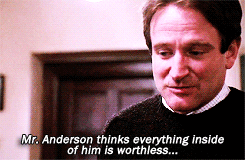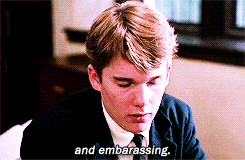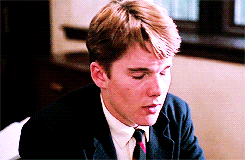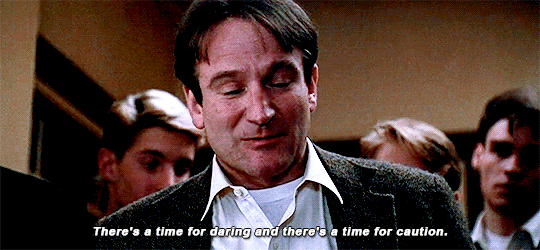Text
How will I address similar situations as a professional teacher?
It is hard to say. I hope to be able to teach my students valuable and important life lessons everyday like Keating, but I feel like I’m more of Todd Anderson character because I don’t quite yet have that level of confidence in my abilities. Unlike Keating, I don’t think that I would ever be willing to pressure my students to take such large and potentially unsafe risks. I myself have still a lot to learn before I am at the same caliber of knowledge on poetry and literature as Keating. I feel like if a student like Neil came to me with the same predicament, where their parents are dictating every step of their lives, I would definitely want to help, and I would start with having a long and deep conversation with my student. I would ask, like Keating, that my students go to their parents and have a sincere and open conversation with them. If nothing seems to resolve, I would have a meeting with the principal, parents, and student present where we would discuss the need for my student to be able to make decisions for themselves.
0 notes
Photo

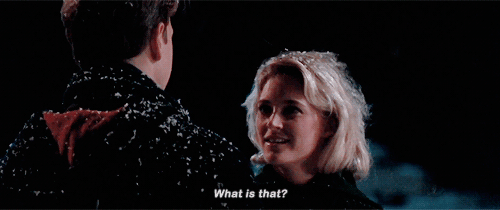

Dead Poets Society Challenge: [3/5] Favorite Scenes
611 notes
·
View notes
Photo

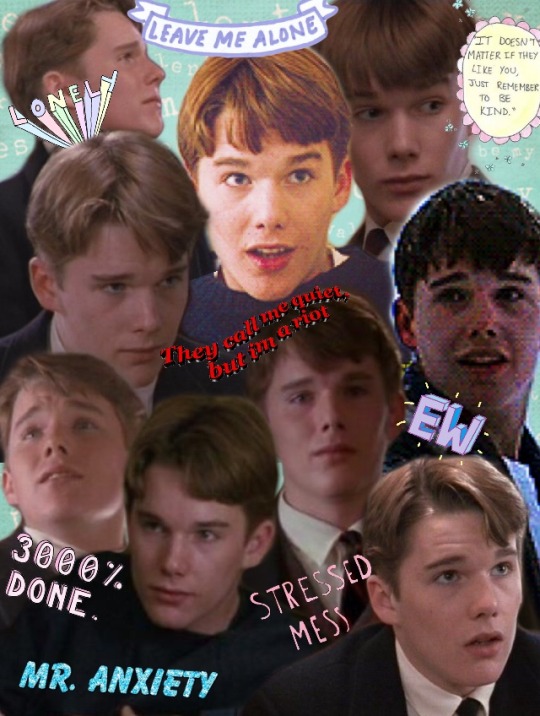



Dead Poets Society collages requested by anon
1K notes
·
View notes
Link
Keating commits a similar action to the teacher in this article. Mr. Keating places his hands over the eyes of Todd Anderson, in order to get his student to pay attention to the task at hand. As clarified in this article “Although teachers may use physical force as a means of correction (see section 43 of the Criminal Code of Canada), this does not save them from investigation under Ontario’s Child and Family Services Act.” The example given in the article is a simple touching of a student’s head and yet this teacher may still face “potential consequences of even this most innocent physical contact with a pupil.”
0 notes
Photo

https://www.ontario.ca/laws/statute/90e02#BK433
(Education Act [R.S.O.], 1990)
Section 264.1 of the Education Act:
Does Keating follow the duties of a teacher?
For the most part, No.
0 notes
Photo
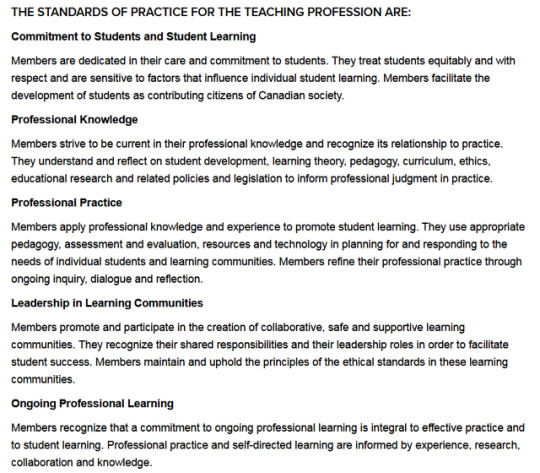
https://www.oct.ca/public/professional-standards/standards-of-practice
Does Keating follow the 5 Standards of Practice?
For the most part it appears that Keating does follow these standards. He is clearly dedicated to the education of his students, although he may not respect the sensitive factors of his students' lives. For example, with Neil Perry's inability to speak to his father, Keating tells Neil to speak to his father the way that he has just spoken to him, and if he's not able to reach out to his father, basically not to worry about it because he'll be "out of school and can do anything he wants" (Haft et al., 2006). He does try to check in with Neil and confirm that everything is going well, but it seems that his student purposefully lies to him in order to miss repercussions from his teacher or stay away from the touchy subject. Keating is clearly knowledgeable on the subject he teaches, being able to recite many poems off the top of his head. He however does not follow the curriculum that Headmaster Nolan has set about, and, who states, "John the curriculum is set. It's proven. It works." Although, Mr. Keating uses unconventional modes of teaching he never explains the research or articles that he uses to support his different modes of teaching. For example, when he uses sport as a way to challenge his students, he doesn't reference some piece of research which has illustrated this unconventional concept. It seems that Keating does reflect on his teaching practice but this is only after Neil dies, and he reaches into Neil's desk and pulls out his copy of 'Five Centuries of Verse' crying after re-reading the first page on the "marrows of life". By then this seems too late. Keating is a leader to his students and he asks them to be leaders in their own lives as well. Considering the principal's ideas on instruction and discipline, Keating does establish a collaborative and safe learning community with his students, where like Dalton in the courtyard scene, they can decide, without repercussion whether or not to participate, as long as they have a good reason. One of Keating's greatest weaknesses is that he does not successfully collaborate with his colleagues, who deem Keating's teaching practices as unbecoming of the school's traditions.
p>
0 notes
Photo

https://www.oct.ca/public/professional-standards/ethical-standards
Does Mr. Keating care for and about his students?
Yes, Keating does show compassion for their needs and desires, like Neil needing his father's acceptance. He accepts his students even when they are flawed or test his patience, like when Todd does not hand in his poem so Keating help's his student produce one on the spot and gain confidence in his own abilities. Keating is empathetic, however, his ability to care for his students’ well-being may be brought into question when he secretly supports them sneaking off campus to perform in the Dead Poets Society. There are a many number of things that can go wrong and harm these students while they have no supervision or protection off campus.
Does Mr. Keating respect his students?
Keating is very fair-minded. When his student Hopkins produces a very simple poem, Keating does not tear his student down; instead, he turns this event into an intuitive lesson on quality not quantity for poetry. He supports the cognitive development of his students, attempting to show them that literature and English is just as important as other subjects that will economically make these students successful in the future.
Does Mr. Keating embody trust?
Although by the end of the movie the school community does not trust Mr. Keating, with the final standing on the desk scene, it is clear that those who knew him best, his students, did trust him. The parents, some students, and colleagues may not trust Mr. Keating by the end, but they do not recognize how Keating has been set up to "fry" (Haft et al., 2006), as Cameron puts it, for Neil's death. Before this, Mr. Keating was very honest about his unconventional modes of teaching, although he does hide his involvement with helping the students start the Dead Poets Society.
Does Keating embody the ethical standard of integrity?
It is hard to consider Keating's teaching practices as reliable or, at all points, moral. For example, Keating does like to lightly belittle his students, as we see with his name calling of Todd and his forcing of students into awkward situations, like the ripping out of the textbook's introduction, where students were uneasy and he yelled at them that the textbook wasn't the Bible, exclaiming "you're not going to go to hell for this!" However, when we consider that he is teaching them important life lessons, which all of the other adults in the movie seem to be shirking away from, Keating has integrity in his commitment to providing the best education for his students' life development.
<
0 notes
Photo

Dead Poets Society (1989) dir. Peter Weir
346 notes
·
View notes
Text
Keating VS Other Teachers
· At the beginning of the school year, many of the students’ other classes have already given the students assignments. In Science, they have 3 experiments and 20 questions. Trigonometry has homework assignments, which have penalties to a student’s final grade when students do not hand them in. Latin starts with the reciting of new verbs in different tenses.
· The Latin teacher, Mr. McAllister, believes that Keating’s class on ripping out the textbook’s introduction was “fascinating, but misguided” (Haft et al., 2006). He tells Keating that he “takes big risks by encouraging them to become artists” and freethinkers. Although these two teachers have different ways of viewing instruction, by the end of the movie it seems that Mr. McAllister, the realist, and Mr. Keating do become friends or very good acquaintances.
· Dr. Nolan, the principal, who becomes the supply teacher when Mr. Keating is dismissed from his position, very much disagrees with Keating’s teaching practices. For example, Keating attempts to explain his lesson in the courtyard to Dr. Nolan, emphasizing that he “always thought the idea of education was to learn to think for yourself.” Nolan replies with, “At these boys’ age? Not on your life.” In addition, when Dalton has his outburst during a school assembly and Dr. Nolan beats him with a paddle as punishment, Nolan explains that these boys are “impressionable,” to which Keating replies, “your reprimand made quite an impression, I’m sure.” Keating’s quick reply is meant to undermine Nolan’s violent form of punishment, which literally left a physical impression on Dalton.
BONUS:
Mr. Keating’s only in person interaction with a parent is with Mr. Perry, who tells him to stay away from Neil, after Keating congratulates Neil on his performance and tells him, “You have the gift. What a performance, you left even me speechless.”
0 notes
Photo
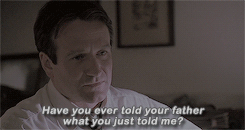
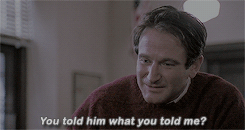
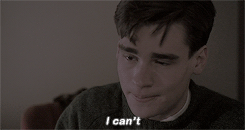
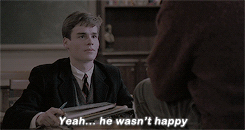
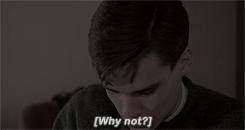
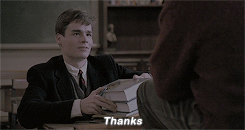
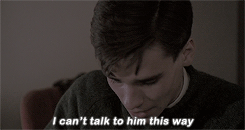
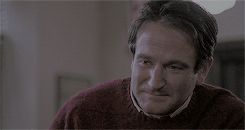
Neil & Mr. Keating requested by anonymous
330 notes
·
View notes
Photo
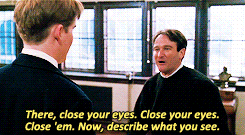


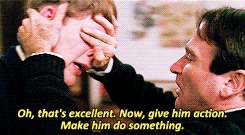


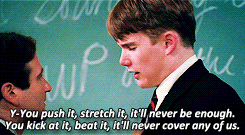
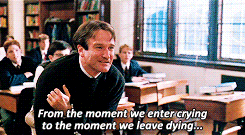
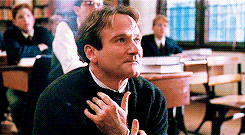
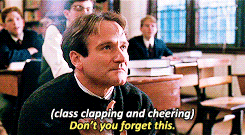
Good God, boy, there’s a poet in you, after all.
Dead Poets Society (1989)
7K notes
·
View notes
Text
Also, it’s important to consider the three specific lessons that he has individually with his students:
• After Dalton’s outburst in the assembly and his punishment from Dr. Nolan, Mr. Keating goes to talk to him and says, “There is a time for daring and a time for caution. And a wise man understands which is called for” (Haft et al., 2006). Keating is asking Dalton to cautiously consider what he says and does at all times.
• Keating also pulls out the fact that Todd believes that he “is worthless and embarrassing,” and then pressures the boy to show that he is not, with the Sweaty-Tooth Madman poem. Perhaps this is done in an unethical or illegal way because Keating puts his hands on a student & at one point calls him a “mole,” but it works in bringing out this student’s self-worth and confidence, which is important for not just this class but life.
• His conversation with Neil, on Neil’s love of acting and his inability to talk to his father, is also very important. Neil explains that he understands his father’s perspective but Neil is upset that his father “never asked [him] what [he] wanted,” instead planning the rest of Neil’s life. Mr. Keating explains that Neil must show his father his passion because if not then Neil will be acting for his father too. Keating tells Neil, “You are not an indentured servant. This is not a whim for you. You prove it to him by your conviction and your passion,” and if he still doesn’t believe you then “you’ll be out of school and can do anything you want.”
0 notes
Photo

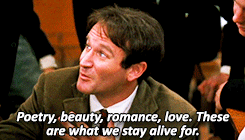


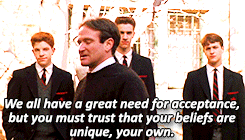



Carpe, carpe diem. Seize the day, boys, make your lives extraordinary.
8K notes
·
View notes
Photo






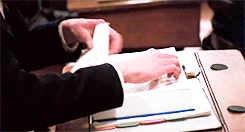
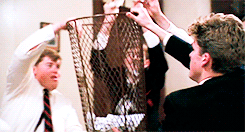
get to know me meme – [1/5] favorite movies: Dead Poets Society (1989)
“Excrement. That’s what I think of Mr. J. Evans Pritchard. We’re not laying pipe, we’re talking about poetry. How can you describe poetry like American Bandstand? ‘Oh, I like Byron, I give him a 42, but I can’t dance to it.’ Now I want you to rip out that page. Go on, rip out the entire page. You heard me, rip it out. Rip it out! Go on, rip it out. Gentlemen, tell you what, don’t just tear out that page, tear out the entire introduction. I want it gone, history. Leave nothing of it. Rip it out. Rip! Begone J. Evans Pritchard, Ph.D. Rip, shred, tear. Rip it out. I want to hear nothing but ripping of Mr. Pritchard. It’s not the Bible, you’re not going to go to Hell for this. Go on, make a clean tear, I want nothing left of it.”
888 notes
·
View notes
